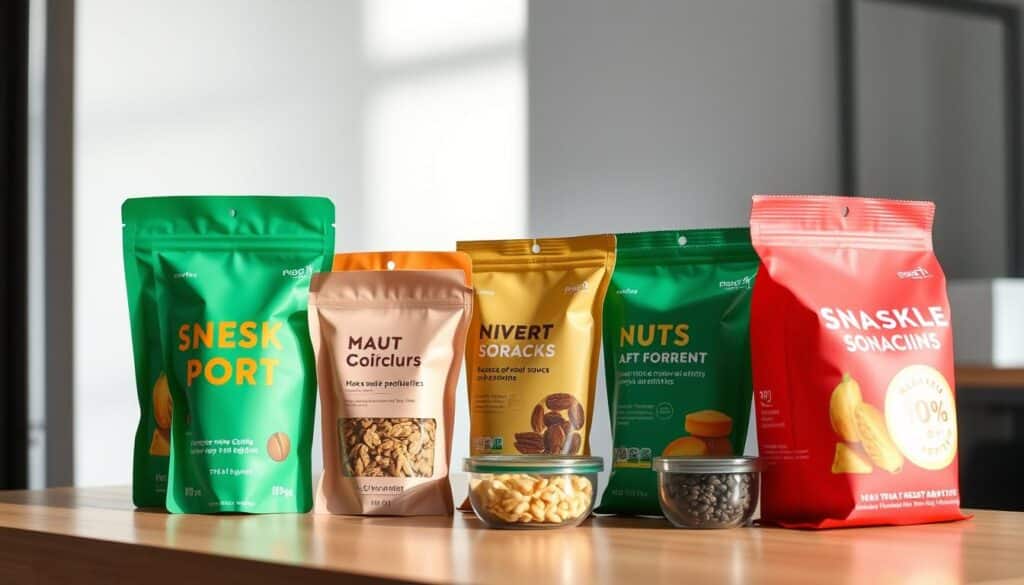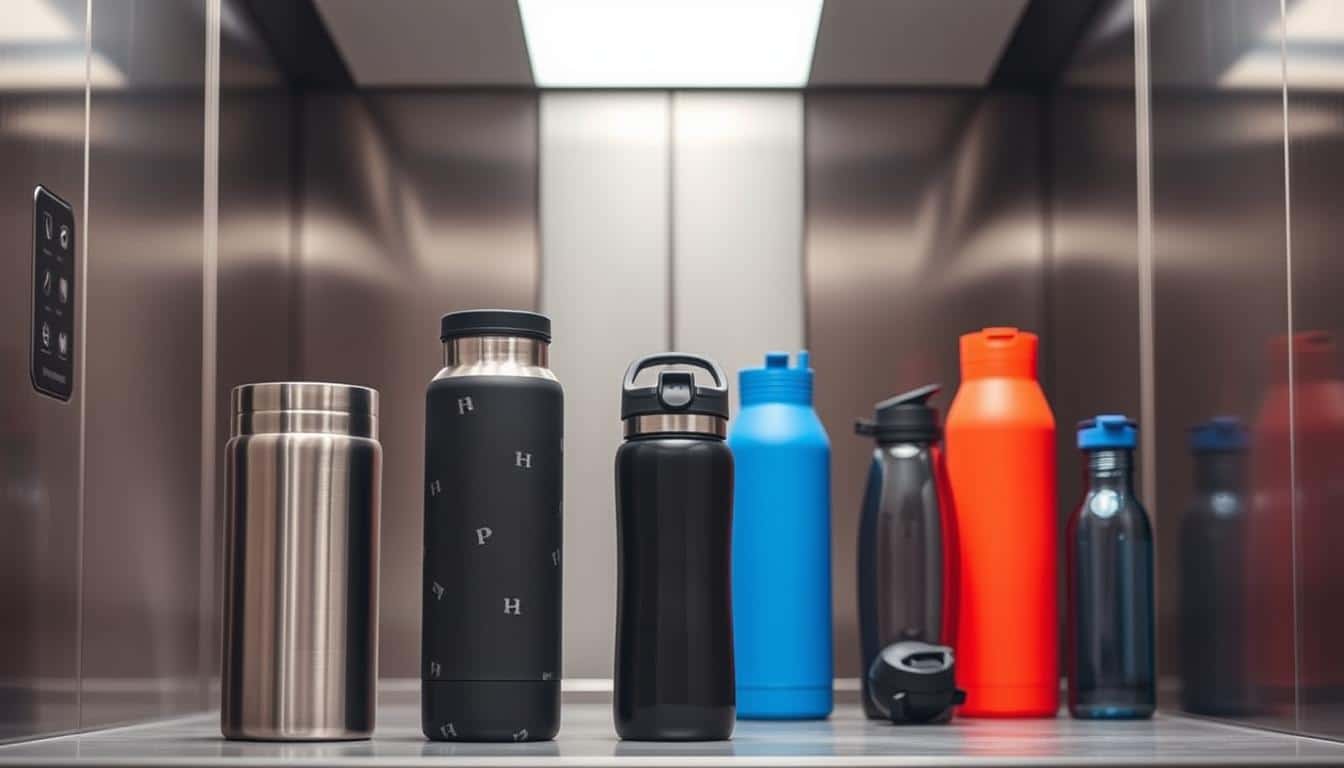Today, more people have food allergies. It’s important for workplaces to have elevator-safe snacks. This helps make sure everyone can enjoy snacks together safely. Providing allergen-free options shows care for all employees’ health. This article talks about why allergen safety matters, the benefits of safe snacks, and how businesses can create a welcoming space.
Understanding Food Allergies in the Workplace
Food allergies present big challenges in the workplace, affecting employees and how the office functions. These reactions can be severe and are important for workplace health. The common allergens such as peanuts, tree nuts, milk, eggs, fish, shellfish, wheat, and soy may cause serious problems. Being aware of these allergies is key in a diverse workplace setting.
There’s been an increase in food allergies in the U.S. recently. Changes in what we eat and our environment play a role. Knowing about these allergies is crucial for employee health. A safe workplace boosts productivity and makes everyone feel included. This leads to higher morale and better team engagement.
Importance of Allergen-Free Options
Having allergen-free snacks is key to making everyone feel included at work. Many people have food allergies, so it’s important for companies to cater to everyone. This way, they ensure everyone’s safety at the workplace.
Such inclusivity makes workers feel important and looked after. Knowing their food needs are met lowers stress about allergic reactions. This creates a happier workplace, leading to more productive employees.
Offering allergen-free options shows a company cares about safety and inclusion. It’s a matter of ethics and builds a strong community feel. So, providing these snacks is smart for any business.
Health Benefits of Allergen-Free Snacks
Allergen-free snacks in the workplace are a big win for health. They cut down the risk of bad allergic reactions among workers. By picking snacks without allergens, businesses create a safer place to eat, boosting employee health.
Also, allergen-free snacks are packed with good nutrients. They help workers snack better and work better. Eating these balanced snacks helps workers feel more energized, making them more focused and driven all day.
Ingredients like seeds, whole grains, and fruits are common in these snacks. They are full of important vitamins and minerals. These nutrients help keep the immune system strong and improve overall health. Choosing snacks without allergens helps make a workplace that values health, which is good for everyone there.
Elevator-Safe Allergen-Free Snacks for Workplaces
Understanding what makes a snack safe for the elevator is key in a diverse workplace. To be elevator-safe, snacks must be free from allergens and reduce the risk of cross-contamination. This ensures that everyone, regardless of dietary restrictions, can enjoy them without worry.
Definition and Importance
Elevator-safe snacks are intended for shared spaces, like elevators, and come in individual packages. They avoid common allergens. They play a crucial role in fostering an inclusive workplace, making everyone feel safe with their food choices.
Examples of Safe Snacks
There are many elevator-safe snack options available. Here are a few:
- Individually packaged veggie chips
- Popcorn from certified allergen-free brands
- Rice cakes and dehydrated fruit
- Nut-free granola bars
These snacks are not only safe but also encourage healthy eating at work. Choosing allergen-free snacks means no one feels excluded during snack time.
Types of Common Food Allergens
It’s key to know about common allergens to keep the workplace safe. Tree nuts are a big worry for many. Learning about tree nut allergies and other allergens can help make office food safety better.
Tree Nuts and Their Risks
Tree nuts like almonds, cashews, and pecans can cause strong allergic reactions. Reactions can be as mild as hives or as serious as anaphylaxis. Those allergic to tree nuts must be careful about what they eat.
Tree nuts can easily contaminate other foods, which is risky for allergic people. Even small amounts can cause a reaction. This shows why it’s vital to have good allergen rules at work.
Other Major Allergens
Other allergens besides tree nuts also need attention. Dairy and gluten can affect many people differently. Workplaces need to educate their teams about these allergens.
It’s important to know how to spot and deal with allergies. This helps create a safer and healthier work environment for everyone.
Guidelines for Allergen-Free Snack Selection
Choosing snacks without allergens needs close attention. It’s important to follow guidelines for selecting snacks safely at work. This section talks about how to identify allergens and avoid cross-contamination. By doing so, employees can lower the risk of food allergy issues.
Label Reading and Allergen Identification
It’s crucial to read labels carefully to spot allergens. Employees should always look at the ingredients on snack packages. Here are important tips:
- Always check for allergen warnings like “may contain” or “made in a facility with.”
- Learn about common allergens in snacks.
- Search for labels that guarantee the snack is free from allergens.
Cross-Contamination Prevention
Avoiding cross-contamination is key to protect people with food allergies. Using the right practices can help make snacking safe. Think about these methods:
- Keep allergen-free snacks away from those that contain allergens to prevent mix-ups.
- Use clean utensils for serving snacks to avoid spreading allergens.
- Educate employees on the right way to handle snacks to avoid accidental allergen exposure.
Popular Allergen-Free Snack Options
Nowadays, many workplaces focus on having snacks that everyone can enjoy. This makes the office a better place for people with food allergies. Some favorite snacks are nut-free and gluten-free.
Nut-Free Snack Bars
For those avoiding tree nuts, nut-free snacks are a perfect pick. Enjoy Life and MadeGood are two brands that make delicious bars without nuts. These snacks are both safe and energizing for people with allergies.
Gluten-Free Crackers
Snacks without gluten are also available, like crackers. They’re great by themselves or with dips. Mary’s Gone Crackers and Simple Mills create these snacks from healthy grains. They’re a good choice for people avoiding gluten.
Fruit and Vegetable Snacks
Fruits and veggies are great for anyone avoiding allergens. They can be single servings or in pre-packed forms. Crunchies make dried fruit snacks that are healthy and safe. Plus, pairing veggie sticks with dips like hummus or guacamole is tasty and crunchy.
Packaging and Transportation Considerations
It’s important to make sure allergen-free snacks are safe and high quality at work. The right packaging keeps snacks fresh and safe from allergens. Taking care when moving them, especially in elevators, helps follow safety rules.
Elevator Safety Measures
Elevator safety is key for moving snacks safely in a building. Workers need to know how to handle snack packages right. They must avoid damage during the move. Keeping elevators clean and clear is also important to prevent accidents. Training staff with safety sheets makes moving snacks safer.
Maintaining Freshness and Quality
Snacks need to stay fresh when being moved to ensure quality. It’s crucial to keep them at the right temperature and humidity. Using sealed containers keeps the taste and nutrition intact. Checking the packaging while transporting snacks avoids safety and freshness problems.

Case Studies: Successful Implementation in Workplaces
Many companies have started offering allergen-free snacks. This change has made workspaces better and safer. Workers now feel more valued because their health needs are considered. Listening to what employees say about these changes is very important.
Examples from Diverse Industries
Companies from different fields are seeing the benefits of having allergen-free snacks. A tech company added gluten-free and nut-free snacks to their vending machines. This made employees with allergies happier and more engaged at work. In healthcare, a hospital introduced allergen-free options in its cafeteria. Both staff and patients have responded positively.
Employee Feedback and Satisfaction
Employees are happy with the introduction of allergen-free snacks. They feel safer and more appreciated. Surveys show that 80% of workers are more satisfied at work now. These success stories show how catering to different dietary needs can create a better work environment.
How to Encourage Inclusivity with Snack Choices
Making a workplace inclusive for all dietary needs is key. It’s all about being proactive and informed about food allergies. This makes team work better. Choosing simple and clear snack options is a way to include everyone.
Creating a Safe Environment
There are ways to make the office safe for everyone. Here are some steps to consider:
- Clearly label all snack items with detailed information about potential allergens.
- Encourage employees to share their specific allergy needs during meetings or through internal communications.
- Designate specific snack areas that are free from cross-contamination.
Promoting Understanding of Allergies
Learning about allergies is important for a respectful office. Sharing facts helps get rid of wrong ideas. It builds a supportive space. Here are ways to do that:
- Hosting workshops or training sessions focused on allergy education.
- Distributing informative materials on common allergies and their implications.
- Encouraging team discussions that allow employees to express concerns and suggestions regarding snack choices.
Creating an Elevator-Safe Snack Policy
Making a good elevator-safe snack policy helps keep the workplace safe. It means creating rules that fit what workers need. Talking to employees helps figure out what snacks work best and makes sure health rules are followed.
Developing Guidelines for Your Workplace
Think about these steps for snack policies at work:
- Conduct a survey to gather employee preferences and allergy information.
- Outline a list of approved snack options that are allergen-free and elevator-safe.
- Establish procedures for labeling snacks to avoid cross-contamination.
- Include training sessions on allergen awareness to educate employees.
Enforcement and Compliance Strategies
For the rules to be followed, set up strong strategies like:
- Regular audits of snack provisions to maintain standards.
- Clear communication of policies through signage and intra-company announcements.
- Incorporation of feedback loops for continuous improvement and adjustment of the policy.
Alternative Snack Solutions for Offices
A wide range of snack options can make the office a happier place. It meets different dietary needs. Both snacks made in-house and those from vendors are important. They make sure everyone finds something tasty and safe to eat all day.
Homemade Snack Ideas
Snacks made by hand add a special touch and let you pick what’s in them. Here are some easy, safe recipes to try:
- Energy Bites: Combine oats, honey, and nut-free nut butter for an instant lift.
- Vegetable Chips: Cut veggies thin, season them, and bake until they’re crunchy for a healthy choice.
- Fruit Skewers: Put different fruits on sticks for a snack that’s fun and fresh.
- Granola Bars: Mix oats, seeds, and dried fruit to make a satisfying snack.
Vendor Options for Offices
Choosing vendors known for allergen-free snacks helps make snack time easy. Look at these trusted choices:
- Enjoy Life Foods: They only make snacks without allergens, like cookies and bars, for everyone to enjoy.
- MadeGood: Famous for chewy granola bars, MadeGood uses safe ingredients and sneaks in veggies for extra nutrition.
- Snyder’s of Hanover: If you want crunchy snacks without gluten, their pretzels are a hit.
- Simple Mills: They offer a variety of mixes and snacks that are free from common allergens.
Pros and Cons of Allergen-Free Snacks
Introducing allergen-free snacks at work has its ups and downs. These snacks aim to keep employees with food allergies safe. But, finding snacks everyone can eat poses a challenge.
Benefits to Employee Wellbeing
Allergen-free snacks make the workplace safer and more welcoming. They help by:
- Enhanced safety protocols that protect employees with allergies
- Increased morale and job satisfaction, fostering a sense of community
- Encouragement of healthy eating habits through accessible options
Challenges in Snack Selection
Despite their benefits, allergen-free snacks pose some hurdles for companies. Some challenges include:
- Cost implications in sourcing higher-quality allergen-free products
- Inventory management issues due to variety and limited shelf life
- Difficulties in satisfying the diverse tastes and preferences of all employees
Conclusion
Introducing allergen-free snacks at work is key for a welcoming space. It means everyone feels important and included, regardless of food allergies. By doing this, firms show care and boost the happiness of their teams.
Moving to allergen-free snacks needs careful planning and a real commitment. It’s about more than just picking snacks. It’s showing a company cares for its people’s health and well-being.
To sum up, providing snacks without allergens is a big step towards a better workplace. It’s about keeping people safe and feeling like they belong. This effort makes workers happier and companies stand out as leaders in care and inclusiveness.



